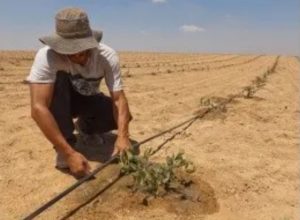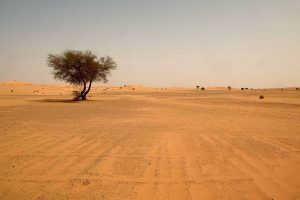Desertification is a process of land degradation that causes the loss of biological and economic productivity, turning it into a desert. Concern about this phenomenon is present in various parts of the world, such as Saudi Arabia, which has decided to fight against desertification.
Through the Vision 2030 program, focused on the protection of the environment, the transition to a greener economy, and environmental restoration, the Arab country has multiplied its efforts against climate change. To achieve this, they have implemented several measures to intensify reforestation, promote clean energy solutions, and expand protected areas.
Furthermore, Saudi Arabia has called on farmers to adopt smart irrigation, given that climate change and desertification are increasingly putting pressure on water and land resources. In this sense, the former businessman turned farmer, Mohamed Alnwairan, has been cultivating in the eastern deserts of the country for 15 years, and in recent years has adopted smart irrigation and a new crop, a consequence of climate change and water scarcity.
According to the businessman, these changes have led to a considerable difference in color, shape, and size, showing the good health of the land thanks to these measures. Alnwairan also uses an application to control and supervise irrigation and water flow, which measures meteorological data to save resources. This means that if rain is expected, the water flow is automatically stopped.

Desertification and Water Stress in Saudi Arabia
Until a few years ago, water scarcity was not a problem in the agricultural lands of the Arabian oasis. However, it began to become a concern when climate change and rice cultivation negatively impacted the resource, especially because the latter requires a lot of water, leading to a drop in the water table level, making access to water more difficult and expensive.
In this regard, FAO irrigation extension expert Mahmoud Abdelnabby explained that “smart irrigation can reduce water consumption by 70% and is more environmentally sustainable.” Currently, farmers do not pay for water, but automation provides other savings, as fewer workers are needed to water the trees, a task that is time-consuming and labor-intensive, especially during the hot months.
Although smart irrigation tools are of advanced technology, they can be easily acquired in the local market and, despite requiring an initial financial investment, their costs are offset by the harvests.

Land Lost to Desertification
More and more productive lands are being lost in the desert areas of Saudi Arabia due to the increasing frequency of droughts and desertification. However, these are not the only factors, as excessive extraction of non-renewable groundwater is another threat to agricultural productivity and food security.
According to FAO and the Saudi Irrigation Organization partner Jaffar Almubarak, smart irrigation is part of the integrated solution to climate change, which also includes crop selection and soil management. “Such an approach can maximize water use but also help rehabilitate the land and work against desertification,” Almubarak stated.
Have you visited our YouTube channel? Subscribe!

